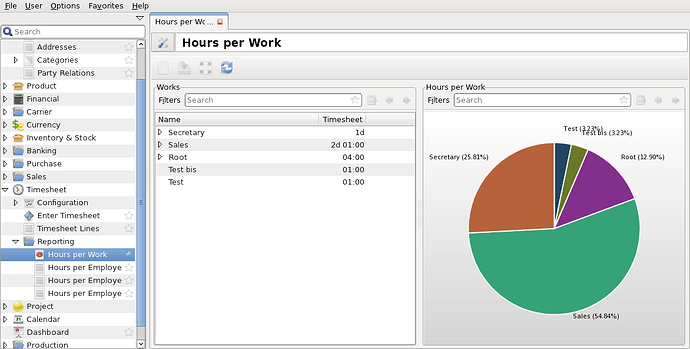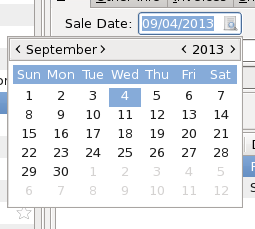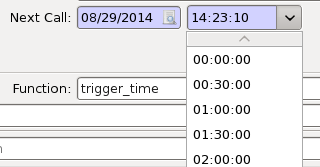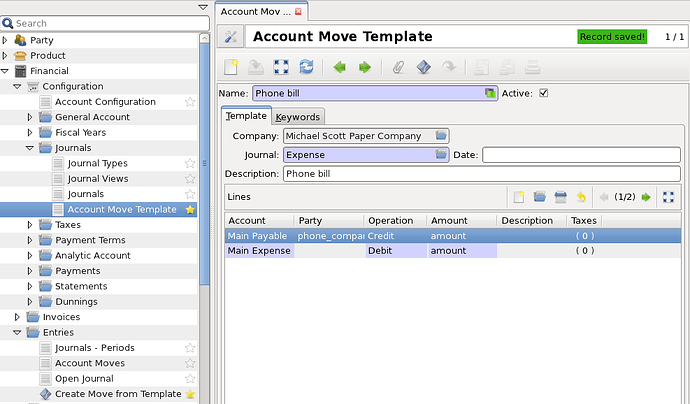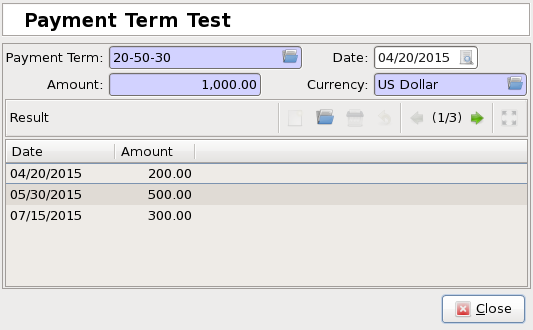We are proud to announce the 3.6 release of Tryton.
The release shows the official support of PyPy which is an alternative implementation of Python which focuses on speed and efficiency.
As usual, migration from previous series is fully supported with the obvious exception of the ldap_connection module which was removed.
Major changes for the user
- A new color scheme for the graphs has replaced the single brightness variance. Now the color scheme also changes the hue for each color by the golden angle (which ensure a color will not be picked twice).
-
The dictionary widget receive completion on key searching like the other widgets.
-
The date/time widgets have been completely rewritten to be more flexible on the format to enter. But they are also more practicable when used with mouse only thanks to the real pop-up for the calendar and the drop down for the time.
- Columns of list view that have always the same value are hidden automatically because they don’t provide information. For example, the list of posted invoices will not show the state column because by definition they are all posted.
Accounting
-
It is now possible to add a description to the cancel move from the wizard.
-
A new option to only show the balance appears in the General Ledger.
-
Tax can now be configured to modify the base price for the next taxes in the list.
-
It is now possible to define templates for common moves. When running a template, the user will be asked to encode some data like an amount or a party, then an account move will be generated with those inputs.
-
A printable report exists now for the depreciation of assets.
-
The account charts for France and Belgium has been updated. And the Belgium one is now translated in dutch.
-
A test wizard is available now to see the result generated by the payment term. As the payment terms are quite flexible because they support to apply many deltas (instead of only one), it is not always easy to forecast the behaviour.
-
The SEPA coverage is now extended to the
pain.001.003.03and008.003.02flavors which are used in Germany. And it is also possible to re-generate a SEPA message in case of wrong configuration on the first generation. -
The statements create moves grouped by default by number, date and party. So when one statement line is split for invoice reconciliation, only one move will be created now and the origin of this move will be the group of the statement lines.
-
Tax rules can now depend on the origin and the destination country thanks to the new module
account_tax_rule_country. -
The CFONB custom (non-standard) format of SEPA is added by the new module
account_payment_sepa_cfonb. -
A new type
depositof account is added by the new moduleaccount_deposit. It allows to invoice deposit and recall later this amount on the next invoice.
Product
- The price list can now be defined as tax included. Tryton will then compute the price without taxes based on the taxes applied.
Sale
-
A new state
wonwas added to the sale opportunity. It goes to this state automatically when at least one of its sale is confirmed and all others are also confirmed or canceled. -
The amount of the opportunity is updated accordantly to the amount of the linked sales. This will give more accurate reports.
-
The computation of the shipment cost is now computed only at the quotation. This lower the load on the client when the order is pretty large as the cost will be computed only once instead of each times a line is added.
-
The new module
sale_extraallow to add extra line on sale based on criteria. The extra can be either a free product or an extra service cost etc.
Stock
-
There is now a relate from the product to its order points.
-
The creation of purchase request warns also on late production like it does for late incoming shipment.
-
The Shelf Live/Expiration Dates are now supported with the new module
stock_lot_sled. When a lot is expired, it is no more used to compute the forecast quantity of the stock.
Commission
This new area is managed by a set of new commission modules. The commissions are created for the agent defined on a sale or invoice using a commission plan.
It is also possible to define principals on the products to which commissions must be repaid.
Major changes for the developer
-
It is now allowed to have many times the same field in list/tree view.
-
There is no more a
datetimewidget for list/tree, two columns with one widget date and one widget time should be used instead. -
A new field
TimeDeltaappears in this release to represent a duration. It replace thefloat_timewidget which had some rounding issue. This new field is already used in thetimesheetandprojectmodules. -
The
One2Manywidget can be configured to use a Cartesian product with the selections of many values forMany2OneorReferencefields. -
A method
restore_history_beforeis added toModelSQLwhich behaves like the existingrestore_historybut restore the records just before the datetime. -
The
on_changemethods have been migrated to a behaviour more consistent with the Active Record Pattern used in Tryton. Instead of returning a dictionary with the values to change, now the instance is directly changed. This allow to chain easily theon_changemethods or reuse them in other methods reducing the duplication. -
The method
saveonModelStorageis now adualmethodwhich means that it can be called as usual as an instance method but also as a class method with a list of records. Saving many records at once this way improves the performance as the method will minimize the number of queries to the database and will validate the result by bunch. -
The
Dictfield received atranslatedmethod to create descriptors which translate the values or the keys like the same method onSelectionfield. -
It is now allowed to use the dotted notation in the order clause of a search. The ORM will automatically generate the needed joins.
-
The API of the
Reportclass has been reworked to improve the customization of the engine. The formatting methods are now more strict to prevent silent failure. -
The
safe_eval(which was not sure to be safe) has been completely removed. In the places where the evaluated code was any way safe, the standardevalis used. For evaluated code from outside, a JSON notation is now used. Some utilities have been developed to ease the creation of JSON from XML or in the views. -
A new kind of button has been added which works on non-saved record. They are quite similar to
on_changebut they are triggered by a click on a button instead of a change of field.
Accounting
-
A new method
reverse_computehas been added to Tax which allow to compute the base amount from the taxed amount. -
The sign of the second currency amount is enforced to be the same as debit - credit.
-
The analytic account management has been reworked to use a really
One2Manyinstead of the pseudo-field. This simplification was possible thanks to the recent new features like the usage ofReferencefield onOne2Many.
Party
- The vat number is now stored in its compact format.
Product
- The number of decimal for internal price calculations is now a configuration parameter
price_decimal. This parameter is used everywhere to ensure consistency between all modules.
Purchase/Sale
- Their lines support both mixed invoice type (Invoice vs Credit Note) per line when computing the invoiced quantity.
Stock
-
A new state
stagingis added to the move. Such state doesn’t impact at all the computation of the stock level. It is used for supply on sale, to create moves in advance. -
Inactive products are still computed for the stock level.
-
The computation of assigned move has been improved to take only in consideration outgoing move assigned not the incoming. This result in a less optimistic for the stock level and thus prevent to assign a move with an incoming one that is just assigned but not yet done.
-
Forecasts are now automatically deactivated when their period is in the past.
